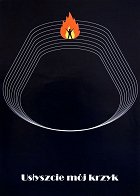Sinopsis(1)
On 8 September 1968, official Harvest Festival celebrations were held at the 10th Anniversary Stadium in Warsaw, attended by Władysław Gomułka, First Secretary of the Central Committee of the Polish United Workers’ Party (PZPR, the communist party), and Prime Minister Józef Cyrankiewicz. Something happened during the event that was not mentioned by the papers, neither in Poland nor abroad, as if no one had noticed anything. Ryszard Siwiec, a clerk from Przemyśl, set himself on fire in front of the crowd of many thousands. He managed to scatter a few leaflets explaining that his self-immolation was in protest against the Warsaw Pact forces entering Czechoslovakia. Severely burned, Siwiec was taken to hospital, where he died. Many years later, on the basis of documents, statements from relatives as well as eye-witnesses, Maciej Drygas, the film’s director, seeks to find out who Ryszard Siwiec was and what cause brought him to inflict such terrible suffering on himself. The film includes fragments of an authentic recording made by Ryszard Siwiec two days before his self-immolation. “I, Ryszard Siwiec, of sound body and mind, after a long struggle and much consideration, have decided to protest against the total tyranny of evil, hatred and lies taking over the world”. These were the words with which he began his testament. Maciej Drygas’ masterpiece is still poignant today. (Warsaw Film Festival)
(más)Reseñas (1)
In addition to this documentary, Maciej J. Drygas dedicated the radio program "Testament" to the memory of Ryszard Siwiec. Both of them are still among the most important landmarks in the commemoration of Siwiec's protest. In the 1960s, the act of self-immolation by Buddhist monk Thich Quang Duc proved to be highly influential, impacting a generation of others who chose to sacrifice themselves for a higher moral principle. More on the Polish realities and the hypothesis of whether Siwiec sacrificed himself in September 1968 out of love for Czechoslovakia is offered by some texts from the pen of Petr Blažek. Fortunately, this abbreviated interpretation can be supplemented by the full story of the growing frustration that grew in Poland after the suppression of student riots in March 1968 (following the premature withdrawal of the "anti-Soviet" play Dziady from the program of the National Theater in Warsaw).
()
Galería (5)
Foto © Warszawski Festiwal Filmowy

